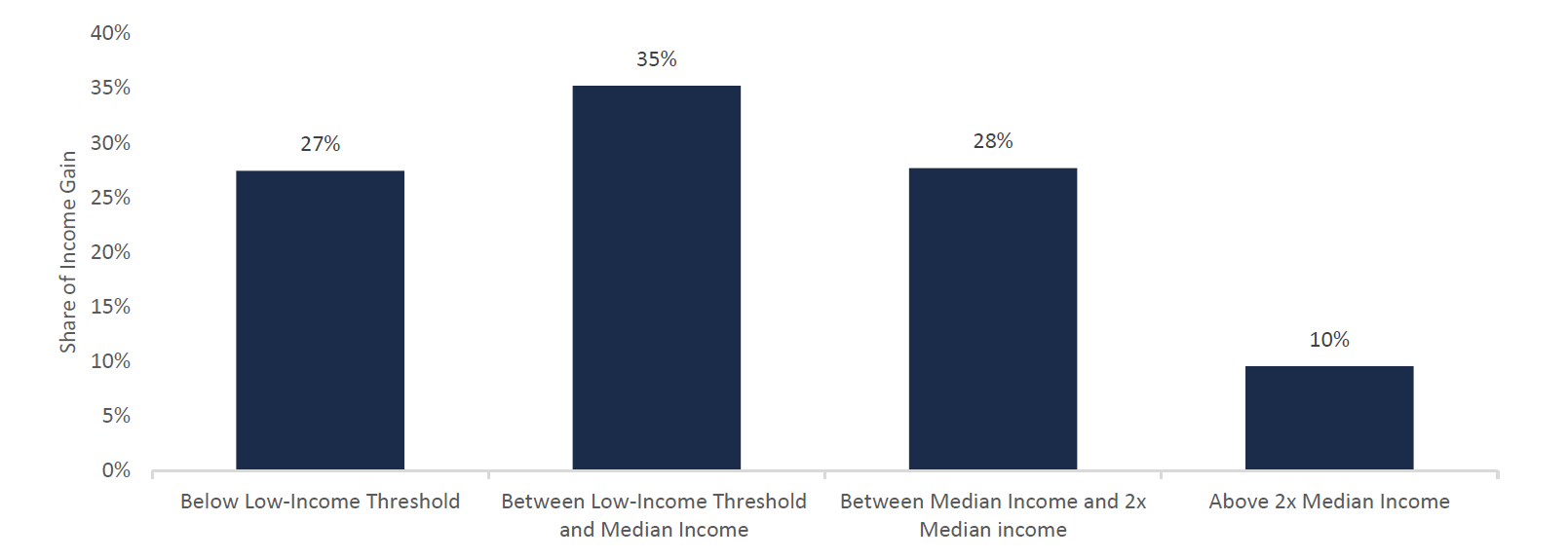Assessing the Economic Impact of Ontario's Proposed Minimum Wage Increase
This is a report from the Financial Accountability Office of Ontario, so not some partisan think-tank.
tl;dr: The increase of the minimum wage in Ontario to $15 an hour is estimated to increase the number of minimum wage workers in Ontario from ~500,000 to ~1.6 million. There is an estimated net loss of ~50,000 jobs as a result. The FAO's analysis suggests that the higher minimum wage will not be an effective tool to alleviate poverty (minimum wages target low-wage workers, but not necessarily low-income families, see last chart).
This is a report from the Financial Accountability Office of Ontario, so not some partisan think-tank.
Key Points
- The government's proposal to raise Ontario's general minimum wage to $15 per hour will dramatically increase the number of minimum wage workers from just over 500,000 currently to 1.6 million in 2019. As well, under a $15 minimum wage, adults and those with full-time jobs would represent the majority of minimum wage workers.
- By comparison, under the current minimum wage of $11.40 per hour, teens and young adults and those with part-time jobs account for the majority of minimum wage workers.
- The FAO estimates that the higher minimum wage will raise total labour income (after adjusting for price inflation) by 1.3 per cent by 2019.[1] However, the FAO estimates that just one-quarter of the higher labour income would directly benefit low-income families. Since the income gains would not be concentrated on low-income families, raising the minimum wage would be an inefficient policy tool for reducing overall poverty.
- The higher minimum wage will increase payroll costs for Ontario businesses, leading to some job losses for lower income workers. At the same time, higher labour income and household spending will boost economic activity leading to some offsetting job gains. On net, the FAO estimates that Ontario's proposed minimum wage increase will result in a loss of approximately 50,000 jobs (0.7 per cent of total employment), with job losses concentrated among teens and young adults.
- However, there is evidence to suggest that the job losses could be larger than the FAO's estimate. Ontario's proposed minimum wage increase is both larger and more rapid than past experience, providing businesses with a greater incentive to reduce costs more aggressively
Background
As part of Bill 148, the Fair Workplaces, Better Jobs Act, 2017, the government proposes raise Ontario's general minimum wage from its current rate of $11.40 per hour to $14 per hour on January 1, 2018 and $15 per hour the following year.[2]
Ontario's Proposed Minimum Wage Increases

Ontario's Minimum Wage Workers
The FAO estimates that approximately seven per cent of all Ontario workers (or about 520,000 people) are earning the current minimum wage in 2017. Approximately 60 per cent of Ontario's current minimum wage workers are teens and young adults while the remaining 40 per cent are adults (25 years of age and older).[3] In addition, the majority of minimum wage earners (about 60 per cent) are part-time employees.
The government proposes to raise Ontario's general minimum wage to $15 an hour in 2019, an increase of 32 per cent over 18 months. This higher minimum wage would be expected to benefit nearly 1.6 million workers or 22 per cent of Ontario's workforce by 2019.
With the expanded coverage of the minimum wage, the composition of minimum wage workers would shift significantly. Under a $15 minimum wage:
- Adults would account for well over half (56 per cent) of all minimum wage workers while teen workers would account for just one-fifth; and
- Full-time employees would also account for a majority (55 per cent) of minimum wage workers.
Minimum Wage Workers by Age Group

The proposed minimum wage increase would also disproportionately impact workers in certain industries and businesses. In particular, small businesses (those with fewer than 20 employees) employ a larger proportion of workers paid $15 per hour or less compared to larger employers. Similarly, the accommodation and food services, retail trade and agriculture industries all employ relatively large proportions of lower wage workers compared with other sectors.
Minimum Wage Workers ($15 per hour) as Share of Total Employment by Firm Size and Industry
%20.png)
Economic Responses to Higher Minimum Wage
The increase in the minimum wage would redistribute income from business owners to workers, raising household incomes but also boosting payroll costs.
In response to higher payroll costs,[4] some businesses will attempt to reduce expenses by substituting minimum wage employees for higher paid, more productive workers or by increasing automation.[5] This would lead to some job losses for minimum-wage workers.[6]
In addition to the direct job losses of lower wage workers, the increase in the minimum wage would impact employment through the broader economy. Businesses would be expected to respond to higher payroll costs by attempting to raise prices. This would be expected to result in a decline in sales, forcing some businesses to scale back production and lay-off some of their workforce.
However, a higher minimum wage would also raise labour income and increase consumer spending. Higher spending would then stimulate economic activity and lead to job creation. The jobs created from higher household spending would be expected to offset some of the loss in employment that would result from the higher minimum wage.
Higher Payroll Costs Could Result in Significant Challenges for Some Businesses
The challenges of adjusting to the higher minimum wage would be more pronounced for firms which rely heavily on minimum wage workers and face highly competitive business environments. For example, businesses in the agriculture and retail trade sectors could face difficulty increasing prices due to competition from international imports and online retailers. In addition, smaller employers may have less flexibility than larger businesses to reduce costs.
Minimum Wage Increase Expected to Result in Moderate Job Losses
To estimate the impact of Ontario's higher minimum wage on minimum wage workers, the FAO has applied results based on previously published minimum wage research.
Researchers have generally found a stronger relationship between minimum wages and employment in Canada than in the United States.[7] Canadian research suggests that a 10 per cent increase in minimum wages has historically resulted in a 3 to 6 per cent reduction in teen employment.[8] The impact on young adult employment is generally estimated to be about one-third of the impact on teen employment. Existing research also suggests that there is no significant impact of minimum wage changes on adult employment. [9]
The government proposes to raise the general minimum wage to $15 an hour in 2019, an increase of 27 per cent compared to what the minimum wage would have been under existing law.[10] Based on existing research, the FAO estimates that the proposed increase in the minimum wage would reduce employment of directly affected workers by about 65,000 jobs.[11] Studies have indicated that businesses which face higher payroll costs typically respond by laying off inexperienced workers. Given this, the job losses would be expected to be concentrated among teens, young adults, and recent immigrants.[12]
However, there is evidence to suggest that the direct job losses of affected workers in Ontario could be larger than the FAO's estimate. Ontario's proposed minimum wage increase is both relatively larger and more rapid compared with most other jurisdictions or historical experience.[13] This could provide businesses with a greater incentive to reduce costs more aggressively than suggested by existing research – which are generally based on more moderate increases.[14]
Job Losses Moderated by Higher Household Spending
As discussed above, a minimum wage increase would also be expected to impact the broader economy by increasing prices and raising household spending.
Researchers have found that a 10 per cent increase in minimum wages would be expected to increase consumer prices by around 0.2 per cent.[15] Based on this research, the FAO estimates that a 27 per cent increase in minimum wages would boost Ontario's consumer prices by about 0.5 per cent. Higher prices would dampen the growth in consumer spending.
At the same time, workers who receive a higher wage would increase their household spending, stimulating economic activity and creating new jobs. However, the higher income and spending of low-wage workers would be moderated by the lower income and spending of business owners who face higher payroll costs.
The FAO estimates that net gain in economic activity generated from the boost to household spending, partially offset by higher prices and lower business income, would lead to the creation of approximately 15,000 jobs, depending on how businesses and workers adjust to the new minimum wage.
As a result, the FAO estimates that Ontario's proposed minimum wage increase will lead to a net employment loss of 50,000 jobs, after accounting for the direct employment loss of minimum wage workers partially offset by the positive impact of higher household spending.
Gains in Labour Income Partially Offset by Employment Losses and Higher Prices
Ontario's proposed increase in the minimum wage would raise the incomes of approximately 1.6 million workers and would also lead to ‘spillover' effects that would result in higher wages for workers earning just above the new minimum wage.[16] Excluding any impacts on employment or prices, the FAO estimates that the proposed increase in the minimum wage, combined with spillover effects, would raise total labour income by 2.0 per cent[17].
However, as previously discussed, businesses would be expected to raise prices and lower employment, offsetting some of the overall gain in real or inflation-adjusted labour income. Including these impacts, the FAO estimates that the higher minimum wage would boost total real labour income by 1.3 per cent by 2019.[18]
Income Gain Broadly Distributed Across Households
The government has identified Ontario's minimum wage as a key policy tool in it's poverty reduction strategy.[19] However, based on the FAO's analysis, higher minimum wages are not an effective way to alleviate poverty.
Specifically, the FAO estimates that:
- Just 27 per cent of the total gain in labour income (resulting from the higher minimum wage) would be expected to benefit low-income families;
- Another one-third of the real income gain would benefit families with incomes between the low-income threshold and the median household income; and
- Households with incomes above the median would receive almost 40 per cent of the income gain.
As a result, the income gains from Ontario's proposed minimum wage increase would be relatively broadly distributed across all households and not concentrated on low-income families. Since minimum wages target low-wage workers, but not necessarily low-income families, raising the minimum wage would be an inefficient policy tool for reducing overall poverty.[20]
Distribution of Income Gains from Minimum Wage Increase

tl;dr: The increase of the minimum wage in Ontario to $15 an hour is estimated to increase the number of minimum wage workers in Ontario from ~500,000 to ~1.6 million. There is an estimated net loss of ~50,000 jobs as a result. The FAO's analysis suggests that the higher minimum wage will not be an effective tool to alleviate poverty (minimum wages target low-wage workers, but not necessarily low-income families, see last chart).
